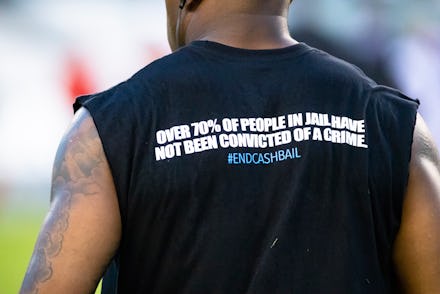Illinois is the first state to get rid of the cruel weight of cash bail

The state of Illinois made history this week, after Gov. J.B Pritzker signed a far-reaching criminal justice reform bill that abolished the cruel and frequently racially disproportionate practice of cash bail.
"This legislation marks a substantial step toward dismantling the systemic racism that plagues our communities, our state, and our nation and brings us closer to true safety, true fairness, and true justice," Pritzker said in a statement Monday announcing his signing of H.B. 3653, a suite of new laws aimed at reforming criminal justice structures and policing policies in his state.
"In this terrible year, in the middle of a brutal viral pandemic that hurt Black people and Brown people disproportionately, lawmakers fought to address the pandemic of systemic racism in the wake of national protests," Pritzker continued. "This bill was also infused with solutions from individuals most directly impacted: survivors of domestic violence, survivors of crime, and those who have been detained pre-trial only because they are poor."
In addition to making Illinois the first state to fully ban the application of cash bail, the new law contains a number of police reforms, including requiring the use of body cameras on every officer by 2025, restrictions on departmental purchased of certain military equipment, and added whistleblower protections. But it's the cancellation of cash bail that really pushes the new measure into exciting, uncharted territory. While ending cash bail has long been a priority within progressive corners — and among some figures of the mainstream Democratic Party, including former California attorney general-turned-Vice President Kamala Harris — Illinois's move to bar it completely marks a turning point in the criminal justice reform movement.
Of course, the change is still a few years away. Rather than simply ending cash bail here and now, the bill gives the court system until 2023 to adopt a new policy wherein judges will be presented evidence to help them determine whether a criminal defendant should be considered a flight risk pre-trial. Then, rather than establish bail — a frequently arbitrary and capricious process that ends up disproportionately affecting lower-income defendants and defendants of color — the judge will make a determination over whether the defendant should remain in custody until their trial.
As is to be expected with a sweeping reform bill such as this, Pritzker's move to sign H.B. 3653 into law has been met with pushback — particularly from among the state's Sheriff's Association.
"In signing this bill into law, Gov. Pritzker chose to listen to a few strident political voices rather than the 120,000 petition signing citizens who plainly saw the bill for what it is," the group wrote in a Facebook post after Pritzker officially signed the legislation. "This new law is a blatant move to punish an entire, honorable profession that will end up hurting law-abiding citizens the most."
But others in the state are far more optimistic about the new law's potential impact.
"Eliminating cash bail ends the practice of detaining non-violent offenders simply because they are poor while also preventing violent offenders from being released because they can afford bail," Cook County State's Attorney Kim Foxx told NBC Chicago.